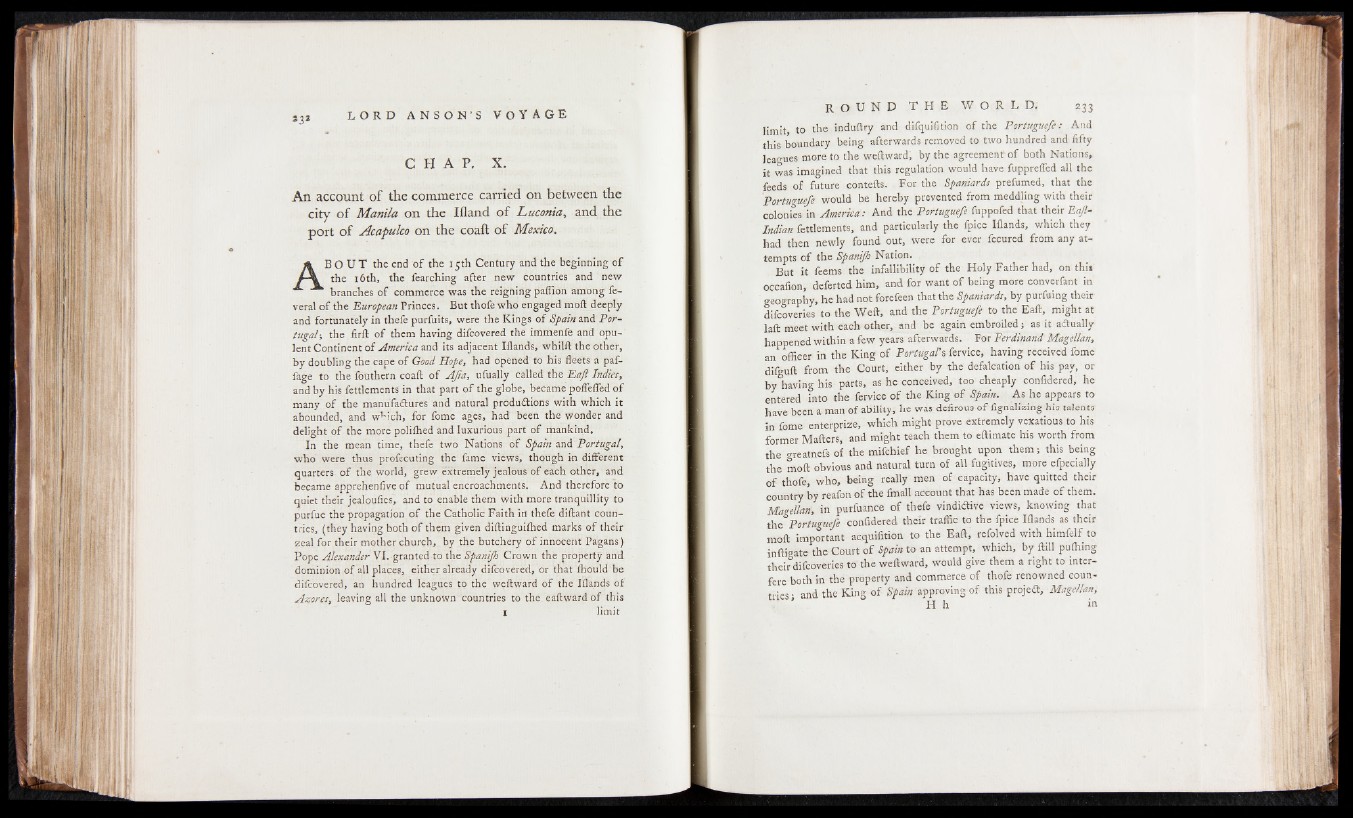
C H A P , X.
An account o f the commerce carried on between the
city o f Manila on the Ifland o f Luconia, and the
port o f Acapulco on the coaft o f Mexico.
AB O U T the end o f the 15th Century and the beginning of
the 16th, the fearching after new countries and new
branches o f commerce was the reigning palfion among fe-
veral of the European Princes. But thofe who engaged moft deeply
and fortunately in thefe purfuits, were the Kings of Spain and Portugal,
the firft o f them having difcovered the immenfe and opulent
Continent of America and its adjacent Iilands, whilft the other,
by doubling the cape of Good Hope, had opened to his fleets a paf-
fage to the fouthern coaft of AJia, ufually called the Eaft Indies,
and by his fettlements in that part o f the globe, became poflefled of
many of the manufactures and natural productions with which it
abounded, and wHch, for fome ages, had been the wonder and
delight of the more polilhed and luxurious part of mankind.
In the mean time, thefe two Nations o f Spain and Portugal,
who were thus profecuting the fame views, though in different
quarters of the world, grew extremely jealous of each other, and
became apprehenfive of mutual encroachments. And therefore to
quiet their jealoufies, and to enable them with more tranquillity to
purfue the propagation of the Catholic Faith in thefe diftant countries,
(they having both of them given diftinguifhed marks o f their
zeal for their mother church, by the butchery o f innocent Pagans)
Pope Alexander VI. granted to the Spanijh Crown the property and
dominion of all places, either already difcovered, or that fhould be
difcovered, an hundred leagues to the weftward of the Ifl'ands of
Azores, leaving all the unknown countries to the eaftward of this
1 limit
limit, to the induftry and difquifition of the Portuguefe: And
this boundary being afterwards removed to two hundred and fifty
leagues more to the weftward, by the agreement of both Nations,
it was imagined that this regulation would have fupprefied all the
feeds of future contefts. For the Spaniards prefumed, that the
Portuguefe would be hereby prevented from meddling with their
colonies in America: And the Portuguefe fuppofed that their Eaft-
Indian fettlements, and particularly the fpice Iilands, which they
had then newly found out, were for ever fecured from any attempts
of the Spanijh Nation.
But it feems the infallibility of the Holy Father had, on this
occafion, deferted him, and for want of being more converfant in
geography, he had not forefeen that the Spaniards, by purfuing their
difcoveries to the Weft, and the Portuguefe to the Eaft, might at
laft meet with each other, and be again embroiled; as it aftually
happened within a few years afterwards. For Ferdinand Magellan,
an officer in the King of Portugal’s fervice, having received fome
difguft from the Court, either by the defalcation o f his pay, or
by having his parts, as he conceived, too cheaply confidered, he
entered into the fervice of the King of Spain. As he appears to
have been a man of ability, he was defirous o f fignaliziug his talents
in fome enterprize, which might prove extremely vexatious to his
former Mailers, and might teach them to eftimate his worth from
the greatnefs of the mifchief he brought upon them; this being
the mod obvious and natural turn of all fugitives, more efpecially
o f thofe, who, being really men of capacity, have quitted their
country by reafon of the fmall account that has been made of them.
Magellan, in purfuance of thefe vindidlive views, knowing that
the Portuguefe confidered their traffic to the fpice Iilands as their
moft important acquifition to the Eaft, refolved with himfelf to
inftigate the Court of Spain to an attempt, which, by Hill pufhing
their difcoveries to the weftward, would give them a right to interfere
both in the property and commerce of thofe renowned countries
and the King of Spain approving of this projeft, Magellan,
H h in